

43 Paid Search Signals You Need To Understand. The SEO world often talks about the idea of signals – data points used by search engines to deliver the most relevant results.
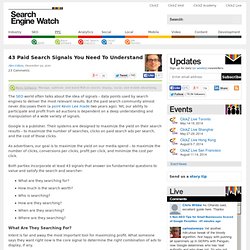
But the paid search community almost never discusses them (a point Kevin Lee made two years ago). Yet, our ability to participate and profit from ad auctions is dependent on a deep understanding and manipulation of a wide variety of signals. Google is a publisher. Their systems are designed to maximize the yield on their search results – to maximize the number of searches, clicks on paid search ads per search, and the cost of those clicks. As advertisers, our goal is to maximize the yield on our media spend – to maximize the number of clicks, conversions per clicks, profit per click, and minimize the cost per click.
Both parties incorporate at least 43 signals that answer six fundamental questions to value and satisfy the search and searcher: What are they searching for? What Are They Searching For? How Much Is The Search Worth? Quality Fit Economic Fit Behavior Social. Understanding Landing Page Quality - AdWords Help. Landing page experience refers to how good we think someone's experience will be when they get to your landing page (the webpage they end up on after clicking your ad).
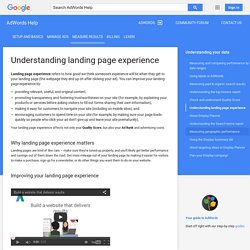
You can improve your landing page experience by: providing relevant, useful, and original content, promoting transparency and fostering trustworthiness on your site (for example, by explaining your products or services before asking visitors to fill out forms sharing their own information), making it easy for customers to navigate your site (including on mobile sites), and encouraging customers to spend time on your site (for example, by making sure your page loads quickly so people who click your ad don’t give up and leave your site prematurely).
Quality Score - AdWords Help. Quality Score is an estimate of how relevant your ads, keywords, and landing page are to a person seeing your ad.
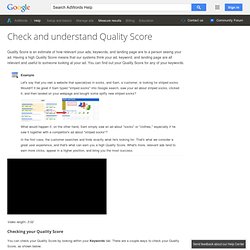
Having a high Quality Score means that our systems think your ad, keyword, and landing page are all relevant and useful to someone looking at your ad. You can find out your Quality Score for any of your keywords. Example Let's say that you own a website that specializes in socks, and Sam, a customer, is looking for striped socks. Wouldn't it be great if Sam typed "striped socks" into Google search, saw your ad about striped socks, clicked it, and then landed on your webpage and bought some spiffy new striped socks? What would happen if, on the other hand, Sam simply saw an ad about "socks" or "clothes," especially if he saw it together with a competitor's ad about "striped socks"?
In the first case, the customer searches and finds exactly what he's looking for. Video length: 3:02. What is the Google Network? - AdWords Help. The concept Your customers tend to do a lot online -- they search, they shop, they read the news and browse interesting websites.
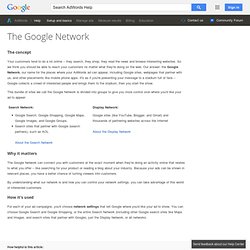
So we think you should be able to reach your customers no matter what they're doing on the web. AdWords Help. 10 Key PPC Best Practices. Home > Best of Larry Chase's Top 10 Internet Marketing Tips This column is written by Kyle Grant, who is the Senior Sponsored Search Marketing Strategist for Enquiro.
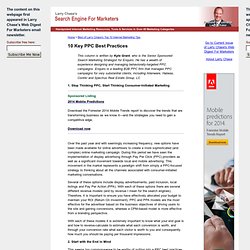
He has a wealth of experience designing and managing behaviorally-targeted PPC campaigns. Enquiro is a leading B2B PPC firm that manages PPC campaigns for very substantial clients, including Alienware, Habeas, Contiki and Spectrus Real Estate Group. LC. Google Analytics: Multi-Channel Funnel Keyword Reports. One of the challenges we SEOs have had in the past was giving a “big picture story” to the question “how much return will I get from doing SEO?” Or “how much has SEO worked for me thus far?” With the advancements of awesome analytics tools in the market today, some of that data is right at the tip of our fingers but it’s a matter of drilling down and pulling that out of the data rumble.
Tracking Campaigns in Google Analytics. To track marketing campaigns, simply insert campaign information into the landing page's query string.
It looks something like this: www.mysite.com? Utm_source=cpc&utm_medium=google.com&utm_campaign=spring_sale First, let's take a look at how Google Analytics keeps track of where a visitor came from. How It Works When a visitor lands on a page with Google Analytics tracking code, the code tries to determine where the visitor came from. This traffic source information will now get sent to Google Analytics with every pageview (unless it gets overwritten), and that information will be used to populate all the traffic reports for the visit. This gives us a way to track details of marketing campaigns and how they are performing in context of all the other visitors to a site.
URL Builder To build these coded URLs, you can use our handy URL Builder tool. Marketing Campaign Variables Whether you use the URL Builder or manually create the destination URLs, you need to use the variables correctly.